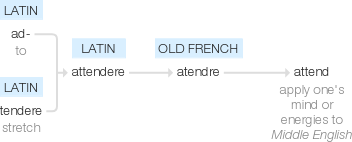Attend
Middle English (in the sense ‘apply one's mind or energies to’): from Old French atendre, from Latin attendere, from ad- ‘to’ + tendere ‘stretch’.
wiktionary
From Middle English attenden, atenden, from Old French atendre(“to attend, listen”), from Latin attendere(“to stretch toward, give heed to”), from ad(“to”) + tendere(“to stretch”); see tend and compare attempt.
From Middle English attenden, atenden, from Old English ātendan(“to set on fire, kindle, inflame, trouble, perplex”), equivalent to a- + tend.
etymonline
attend (v.)
c. 1300, "be subject to" (obsolete); early 14c., "direct one's mind or energies" (archaic), from Old French atendre "to expect, wait for, pay attention" (12c., Modern French attendre) and directly from Latin attendere "give heed to," literally "to stretch toward," from ad "to, toward" (see ad-) + tendere "stretch," from PIE root *ten- "to stretch." The notion is of "stretching" one's mind toward something.
Sense of "take care of, wait upon" is from mid-14c.; that of "endeavor to do" is from c. 1400. Meaning "to pay attention" is from early 15c.; that of "accompany and render service to" (someone) is from mid-15c., as is that of "be in attendance." Meaning "to accompany or follow as a consequent" is from 1610s. Related: Attended; attending.
